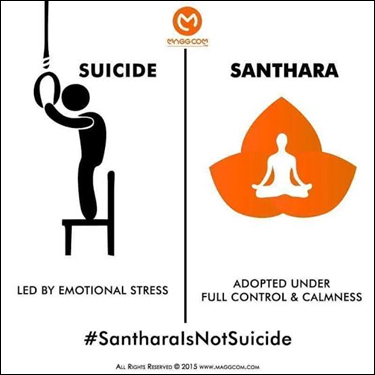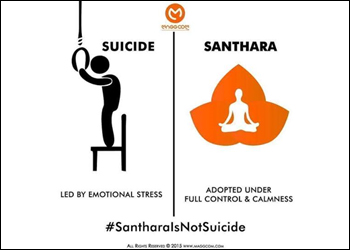
However, body is killed painfully in suicide whereas it is respectfully and peacefully left in Santhara. Suicide is a complex human behaviour. There is no one specific reason as to why people choose to end their life. Santhara is an equanimity of human behaviour and there is only one specific reason to end life. i.e. Spirituality. It is a practice in which a person stops blissfully all life support inputs like food, water, medicines and all other activities. He or she then waits for a peaceful death along with a wish for a good yoni in the next birth. It is a Jain tradition based on the principle of Jainism that a person has a body made of material particles, known as karma and a soul. When a person dies, it is only his body which dies; his soul departs to some other birth destination depending on his past action i.e. karma.
In the last fiddle of life, in an imminent crisis situation in which there is every possibility of end of life, Santhara is waiting for the coming of death by abandoning the entire diet, but in suicide it is the act of purposely or intentionally ending one’s own life. It is sometimes a way for people to escape pain or from ignominious suffering. Suicide is the product of psychological unhappiness whereas in Santhara, one may be physically weak but it denotes psychological happiness, eternal peace with himself or herself, in the state of equanimity of mind, and being constantly hopeful of spiritual emancipation. Suicide is a permanent solution to a temporary problem. Santhara is a peaceful victory over death. Suicide is condemned in most societies whereas in Jain tradition, Santhara is a quiet celebration of life.
There is no comparison between Suicide and Santhara. Both are totally different in nature and practice. Suicide is generally committed secretly without any permission but Santhara process is done in presence of family members and concerned carried with self-conscious, with complete detachment from mundane activities and worldly life desires. Suicide is definitely not a desire to live. In suicide, there is a determination to die. In Santhara there is no desire to die but to embrace death delightedly to proceed to another destination.
I was so lucky to see Sallekhana very closely, a few months back. My grandfather Dr. Sagarmal Jain, a Great Jain philosopher, took a Sallekhana. At that time, I realized that peaceful death does not mean dying easy. It is very hard to accept the reality of death. My Grandfather suffered hardship due to frail health. Body organs were becoming non-supportive and heart condition developed. But his spirit was so high that while teaching to Jain saints, editing research papers and philosophical work, he never allowed himself to fall prey to the frail health hurdles in his literary work. In fact, it was a miracle that while engaging himself in literary work, his soul and subconscious mind was active in his physical body, as if an absentee landlord. In fact, he used to detach soul from body. He also authored scholars’ research papers on Sallekhana. That is why he succeeded to embrace death in a state of complete detachment of worldly life desires and in zero state of mind delightedly. For two days of Santhara he was absolutely in a quiet and eternal meditation state. He was completely conscious to listen to the recitation of Jain agam and seemingly stopped at the last breath at the end of pratikraman. He renounced his body significantly with delighted facial sign of equanimity.



Your point of view caught my eye and was very interesting. Thanks. I have a question for you.
Thank you, please ask the question. Your question can further increase my knowledge.
I don’t think the title of your article matches the content lol. Just kidding, mainly because I had some doubts after reading the article.